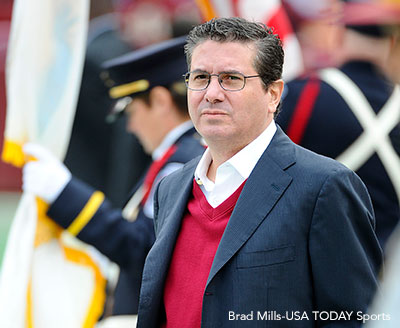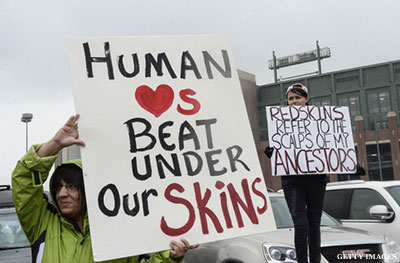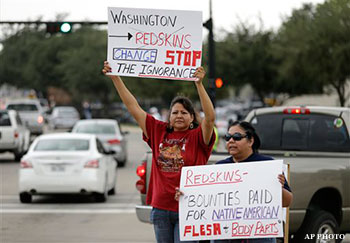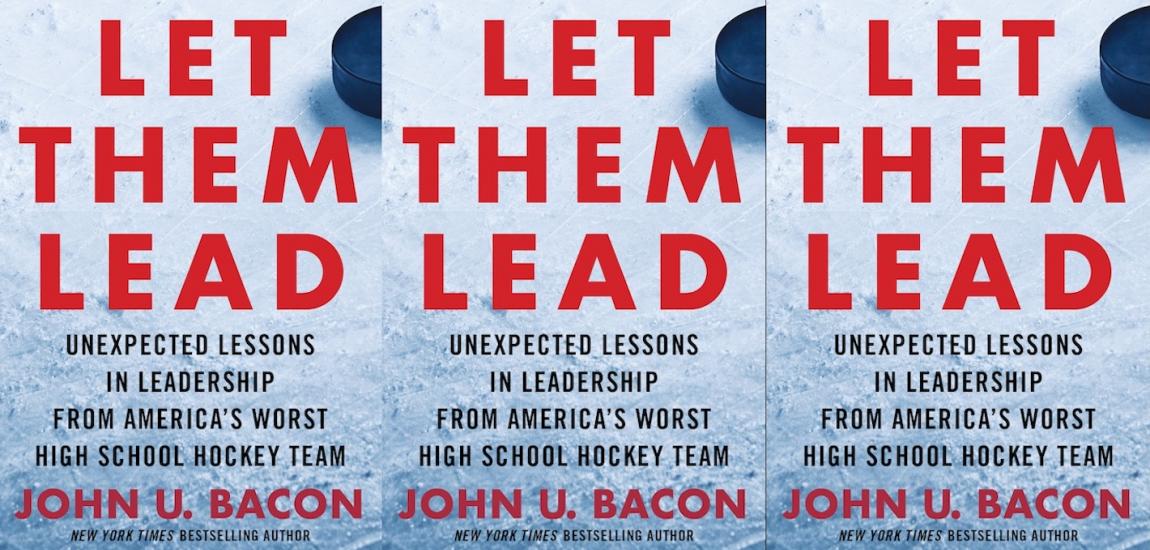The NFL, despite its massive success and unprecedented earning power, is at its most pivotal moment since the AFL-NFL merger four decades ago. Key issues include multiple domestic violence cases, the health and longevity of current and former players and drug use within the league. Is it possible that the league could collapse in on itself? Bleacher Report football columnist Mike Freeman tackles these matters and more in Two Minute Warning: How Concussions, Crime, and Controversy Could Kill the NFL (And What the League Can Do to Survive). In this excerpt, Freeman, whose career includes tenures at the Boston Globe, CBSSports.com, Dallas Morning News, Florida Times-Union, New York Times and Washington Post, puts Daniel Snyder's refusal to change the Redskins' nickname in unique personal perspective:
There are many ways to begin to understand Daniel Snyder and his almost pathological stubbornness in refusing to change his NFL team's nickname, even though many in the American Indian community and others find it offensive. There are many ways, yes, but the most important is understanding two vital facts about him: Snyder is a Marylander and a lifelong fan of the team. Those two facts drive him, his philosophy and his inability to see the other side of the nickname issue.
Sure, there are other reasons why Snyder remains immovable on the nickname. But I believe it is his fandom that drives him the most. Snyder's stance on the nickname has been consistent. "We'll never change the name. It's that simple. NEVER," Snyder told USA TODAY in May 2013. "You can use caps," he added.
The issue of what is offensive to American Indians has become a contentious one, even opening another front in the culture war. It has been argued in sports bars and living rooms, from the nation's capital to Indian reservations. People like Snyder who grew up fans of the team protect the nickname because it has become a part of their identity. It's part of who they are, how they see themselves. And though deep in their core they know the nickname is wrong and offensive, some fight to protect it because they see it is a part of history, their history.
I know all this because I lived it myself. I was born in Washington D.C. but raised in one of the great social experiments of the 20th century, a planned community called Columbia, in Maryland. The city's goal was to eliminate racial, religious, and financial segregation. At the time of Columbia's founding in the mid-1960s, nearby Virginia had just banned interracial marriage. D.C. was highly segregated, as was most of the state of Maryland. As time went on, in the years after my family moved there, I grew up with people every conceivable race -- including American Indians -- had friends of various ethnicities and dated girls from different racial backgrounds. I was arrogant in my belief there wasn't a single bigoted bone in my body -- and completely unaware I loved a team that racially insulted an entire people.

Worse, the only time I thought of the nickname as a slur while growing up was during Catholic high school. A Colts fan and I got into a fight when he called my team the "Niggerskins." We scrapped and both got detention or "JUG" (Justice Under God). I was offended at the use of the N-word but not at "Skins." Somehow, my love of the team allowed me to be angry over one slur but fail to recognize the other.
Marylanders are among the most insecure and proud people in the country. They straddle the line between genteel Southernness and hearty East Coast abruptness. But mostly, its insecurity that defines us. We're good, decent people ... but insecure. Maryland is the little brother standing in the wings while New York struts on the red carpet for a movie premiere. Philly possesses a greater sense of historic greatness, which is also shared by Delaware. And while many Americans view Washington as a symbol of political gridlock, it is the nation's capital. All of this makes Marylanders, particularly the ones closer to D.C., feel like second-class citizens, and we grab on to any sense of pride we can. That's where Washington's football team comes in.
Growing up, I followed the Colts and Washington, gravitating toward the Washington team, long before the Colts moved to Indiana in the dead of night. And when Baltimore stole a team from Cleveland, that cemented my Washington allegiance for good.

The Washington team made us feel relevant. Washington fandom has long been extremely underrated. Everyone around me -- family and friends, neighbors, the postman, the babysitter, everyone -- cherished the team. When it played, time stopped. A football team placated our insecurity.
Snyder grew up in Silver Spring, Maryland, about 25 minutes from Columbia and minutes from the Washington, D.C., border. He grew up adoring the team, particularly during the Joe Gibbs era. Snyder and I have talked about this -- the strangeness of how a football team, a game, can have so much significance in your life. Snyder grew up a Marylander with those same Marylander insecurities, and I believe he uses the nickname issue as a rallying cry to solidify his football base. To Snyder, the critics are not attacking a name. Rather, they are attacking all of us ... Maryland and D.C. folks who love this team. I can't say I speak for all Marylanders, of course. Some will say this notion is insane. Yet I can say that every Marylander I know has a deep and personal connection to the team.
The irony is that a significant number of fans are African American. If there is any group that should be sensitive to a slur, it is us. Yet it seems many black fans support the name and this remains the most tragic part of the Washington team nickname story.

In my family, I was raised to be aware of my roots and history. My family's Maryland ties go back to the 1600s and an Irish woman named Eleanor Butler (her nickname was Irish Nell), who came to America as an indentured servant to Charles Calvert, or Lord Baltimore. Calvert preached religious tolerance, and Butler would eventually fall in love with a slave, marry him, and produce a family.
My D.C. roots trace back to a woman named Elizabeth Proctor Thomas, my mom's great, great aunt, a freewoman and civil rights activist who once met Abraham Lincoln. So I'm related to an Irish freedom fighter from Maryland and a black activist from D.C. I was always socially aware of race, studied my history extensively and yet I was totally ambivalent regarding my favorite football team's questionable nickname. I was part of a racially conscious family in a racially tolerant community with racially diverse friends and family, yet we never once discussed that Redskin is a Webster-defined racial slur. None of my black friends and I did either. Ever. That is the power of growing up a Washington football team fan in Maryland.
Why is it so powerful? Because thinking seriously about the nickname ruined our football utopia. It was our insecurities at work. Yes, it's a racist, flawed nickname, but it's our racist, flawed nickname. So even though we were all being extremely hypocritical, we ignore the Redskins slur. Yet if after purchasing the team, Snyder renamed them the Washington Niggers, we wouldn't have stood for it. There'd be a million blacks marching on Washington, and we fans would've been among them.

Joel Barkin, a spokesman for the Oneida Nation, which opposes the Redskins nickname, told me, "I think what a lot of [Native Americans] that oppose the nickname see with Snyder is that so much of him is wrapped up in that team. In many ways it defines who he is. To him, giving it up means giving up a piece of himself. That's how we see it.
"With Snyder, that brand, even though the name is racist, that brand means everything to him. I think Snyder feels, 'This team meant something to me as a child. My connection to this team is worth more than you, an American Indian, being offended.'"
To Snyder and the NFL, the nickname isn't racist. It is a point of pride -- particularly to someone like Snyder. Remember those Maryland roots. He watched his heroes, guys like Joe Gibbs and Joe Theismann and Doug Williams and Art Monk and John Riggins, all wear that helmet with pride. Preserving the history of the team is paramount. If it offends a significant number of people, so be it. And if Snyder has to pay a bunch of suits to take PR bullets for him, so be it.
-- Excerpted by permission from Two Minute Warning: How Concussions, Crime, and Controversy Could Kill the NFL (And What the League Can Do to Survive) by Mike Freeman. Copyright (c) 2015. Published by Triumph Books. All rights reserved. No part of this excerpt may be reproduced or reprinted without permission in writing from the publisher. Available for purchase from the publisher, Amazon, Barnes & Noble and iTunes. Follow Mike Freeman on Twitter @mikefreemanNFL.






